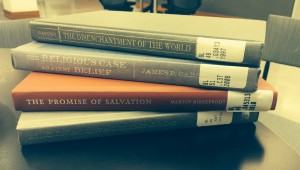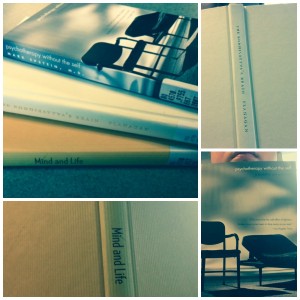Carse, James P. The Religious Case Against Belief. New York: Penguin, 2008. Print.
Gauchet, Marcel. The Disenchantment of the World: A Political History of Religion. Trans. Oscar Burge. Princeton: Princeton UP, 1997. Print.
Riesebrodt, Martin. The Promise of Salvation. Chicago: U of Chicago, 2010. Print.
Rüpke, Jörg. Religion: Antiquity and Its Legacy. London: I.B. Tarius, 2014. Print.
My Shelfie book search began through the catalog on the Lafayette Library website. I thought I would keep my search as basic as possible to explore the greatest number of possibilities. I simply searched “religion” in the catalog and scrolled through to find the sources that were books versus online materials. The first book I found that I thought sounded interesting is the one by Jörg Rüpke, entitled Religion: Antiquity and Its Legacy. What I figured I might focus on is the interrelated nature of logic and religion. Oftentimes, it is assumed that religion falls outside the realm of logic, but it is also often overlooked that there is a logic to religion. Furthermore, I thought it would be interesting to play with the notion of working with materials that are seemingly antithetical to religion or that challenge popular notions of/within religion.
Looking around the area where I found the first book, I found the other three. I chose them based on their titles and what I thought they would offer and found some interesting titles within the table of contents:
The Religious Case Against Belief by James P. Carse
Part I: Belief
Part II: Religion
Part III: Religion Beyond Belief
Conclusion: For the Recovery of Wonder
The Disenchantment of the World: A Political History of Religion by Marcel Gauchet
Chapter 3: The Dynamics of Transcendence
– Distancing God and Understanding the World
– From Myth to Reason
Chapter 4: From Immersion in Nature to Transforming Nature
– The Other World and Appropriating This World
– The Structure of Terrestrial Integrity
Chapter 5: The Power of the Divine Subject
– The Turn Toward Equality
Chapter 6: Figures of the Human Subject
– Being-a-Self: Consciousness, the Unconscious
– Collective-Being: Governing the Future
– Living-with-Ourselves: Absorbing the Other
The Promise of Salvation by Martin Riesebrodt
1: Religion as Discourse: On the Critique of the Concept of Religion
2: Religion as Social Reference: On Justifying the Concept of Religion
3: Scholarly Imaginations of Religion
– Religion as a Divine Gift of Reason
– Religion as an Experience of Revelation
– Religion as Projection
– Religion as Protoscience
4: Religious Practice and the Promise of Salvation
– Defining Religion
– Understanding Religion
– Explaining Religion
…etc.
Religion: Antiquity and Its Legacy by Jörg Rüpke
Chapter 1: Individual and Corporate Religion
– From religion to religions
– Individualization
Chapter 2: Historicizing Religion
While many of the concepts featured in the tables of contents for each book differ considerably, what I hope to gain from these texts is a more streamlined hypothetical standpoint from which to begin my research. I do certainly want to focus less on a particular religion than on the dynamics of religion itself.

